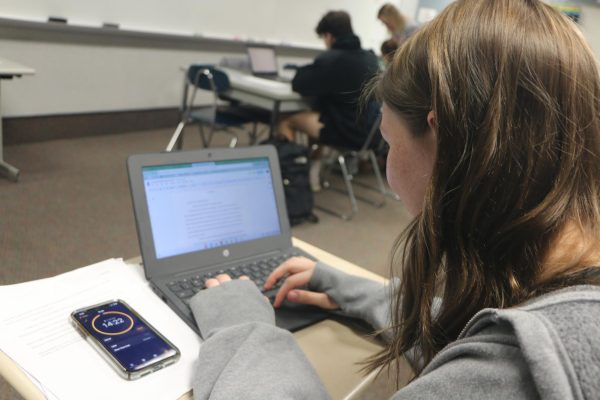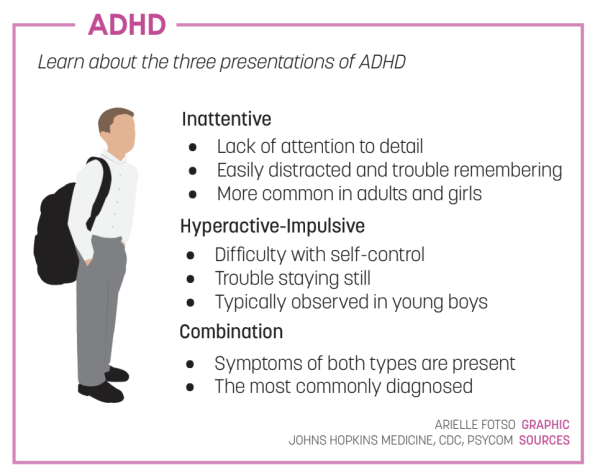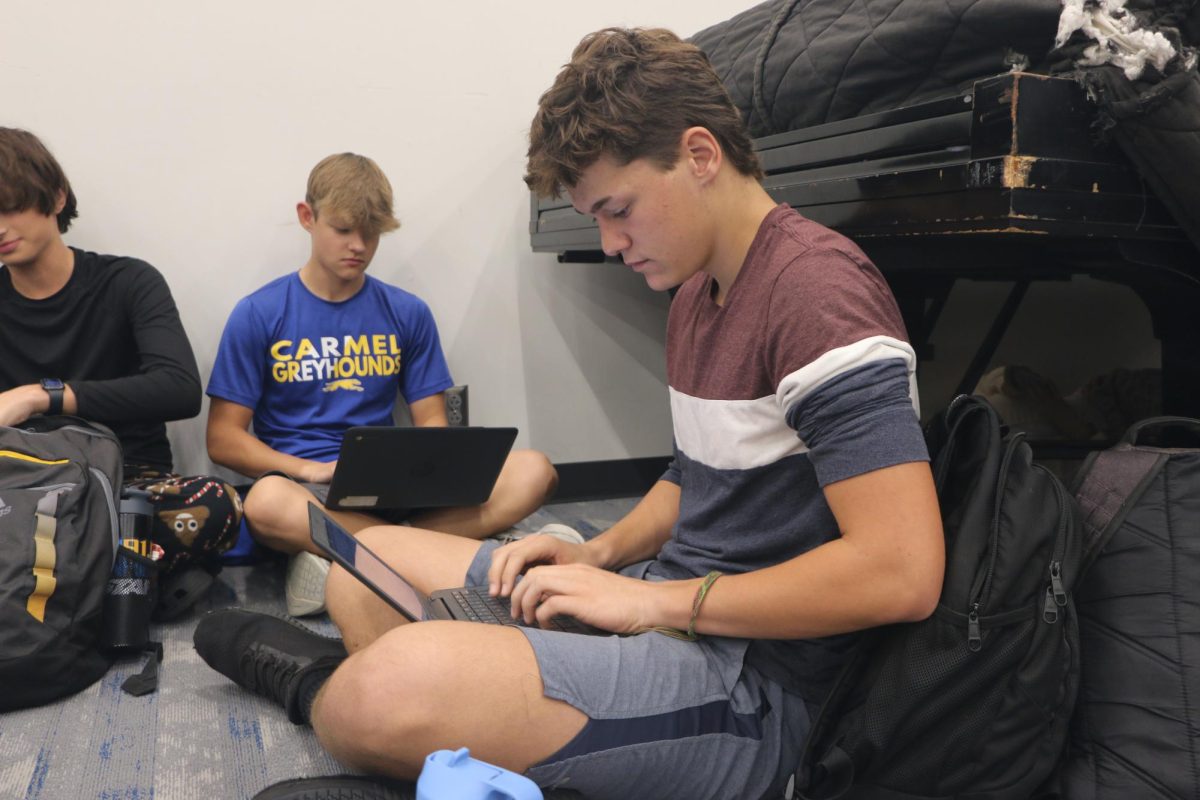Senior Claire Fackler, said her ADHD, a neurological development disorder which causes children to struggle with paying attention and controlling compulsive behaviors, has had detrimental effects on her relationship with school environments.
“School can be really frustrating for me. A lot of the time teachers and other students don’t know how hard it can be to focus in school with ADHD,” Fackler said. “ADHD affects me a lot in a school environment, especially in chaotic learning environments and loud classrooms. Even small noises such as pens clicking can be distracting.”
Fackler also said her academic career has been significantly hurt by her ADHD.

“My performance in school is definitely affected by my ADHD. Not because I’m not smart, but because deadlines can be hard to remember, classrooms are distracting, and lots of assignments can be very overwhelming,” Fackler said. “It can be frustrating because I know how to do the work, I just can’t make my brain do it. On a good day I can stay relatively focused, but if I’m having a difficult day, it can be nearly impossible to focus on what’s going on. If I get too overwhelmed or distracted, I start to shut down.”
Like Fackler, Marcus Grethen, member of Carmel Marching band and sophomore, said he also struggles with focusing during school.
“It’s difficult for me to manage all of the school (work) while trying to stay focused in class and do other things outside of school,” Grethen said. “Anything can distract me (at school); my mind wanders a lot so it’s hard to really focus on too much. Things in my (school) environment paired with other subjects in my life often distract me from focusing on one thing at a time.”
Furthermore, Grethen said his ADHD makes it harder for him to be mentally present while engaging in extracurriculars.
“In marching band specifically, it’s a lot harder to focus,” Grethen said. “With marching band, we’re out there for hours at a time and it can be hard to stay completely honed in on what we need to be doing, without my mind wandering or doing something else, especially when it’s really boring out there.”
Fackler and Grethen aren’t alone in their struggles with ADHD. According to the Centers For Disease Control and Prevention (CDC), 6 million kids from ages 2-17 have been diagnosed with ADHD.
Jeremiah Ellingsworth, founder of IndyADHD and psychiatrist, said students with ADHD are programmed to be flooded with many thoughts at once, which makes it harder for them to focus on one task at a time.
“ADHD can make it challenging for students to maintain focus on a single task or stay organized. They may be easily distracted, have difficulty paying attention to details or make careless mistakes,” Ellingsworth said via email. “They may also have trouble with follow-through on tasks and instructions. Some students have difficulties staying in their seats or refraining from speaking at inappropriate times.”
Fackler said ADHD makes her feel like she has a million things going on at once and can cloud her brain.
“Having ADHD for me feels like there’s a hundred people inside my head who are all talking (to me) and telling me things at the same time,” Fackler said. “It’s a very overwhelming and overstimulating disorder, and as a result I feel extremely tired at the end of a school day.”
Ellingsworth said ADHD can be caused by various variables and alters certain brain components, resulting in a less consistently focused brain.
According to Ellingsworth, ADHD is caused by a combination of genetics, environmental factors, and issues with brain neurotransmitters. It’s associated with different brain structures in areas regarding attention and impulse control.
“In a brain with ADHD, certain areas, especially those that help us focus and control our actions, might not be as active as usual,” Ellingsworth said. “There may be differences in the levels of certain neurotransmitters, such as norepinephrine and dopamine.”

STRATEGIES TO MANAGE ADHD
Despite ADHD being a serious learning disorder, Dr. Ellingsworth said there are many helpful strategies to help curb the impacts of ADHD, such as dividing tasks into segments, using checklists, timers, and daily physical activity.
“For those who continue to have difficulties after using these strategies, therapy and/or medication could potentially improve symptoms,” Ellingsworth said.
Fackler said she uses some of these strategies, like dividing tasks in her daily life in combination with other strategies she’s created to cater to her specific needs.
“Some ways I have managed my ADHD is by learning coping skills in therapy and taking medication for ADHD. A couple ways I (learned to) cope (with ADHD) is by deep breathing (exercises) to reset my train of thought, and taking small breaks in between tasks to keep my brain from overwhelming itself and to reset my focus,” Fackler said. “I am a visual learner, so I focus better when I watch videos or physical demonstrations of the material. This helps me study for tests and actually understand the material I’m learning.”
Grethen said he also employs strategies to manage his ADHD at school, he said time dividing his workload into sections and group work have helped him the most.
“Sometimes I try to minimize distractions like by putting my phone away or like getting into a good (learning) environment. I also enjoy more interactive and social aspects of learning. I love group projects and I love, you know, working with people and collaborating, that’s when I learn the best,” Grethen said. “It’s also easier to break things up into different sections. Like, I could learn 30 minutes of chemistry, (then) 30 minutes of math), (then) 30 minutes of English; it’s easier when I break things up.”
Grethen said he also combats the impacts of ADHD by trying to be present when he gets bored.
“I think you just have to be able to kind of find your own, like, just peace in boredom,” Grethen said. “Even when you’re not doing anything, you gotta find your own way to, like, contain yourself in your own mind. So you can sit (in class) and be doing nothing but still be focused and not zoning out.”
HOW SCHOOLS CAN HELP
Fackler said she wants schools to utilize more strategies to make learning easier for people with ADHD and to better educate teachers about the effects of ADHD.
“Some things I would like from the school to help with learning are to incorporate more small breaks between tasks into the class period,” Fackler said. “Having teachers and staff be more educated on what ADHD can look like and how it can make things difficult for students would also be very helpful.”
Grethen said he wishes teachers were more understanding when it came to learning disabilities and for teachers to provide resources recapping lessons.
“I feel like (teachers should) just treat your students with kindness even when they don’t understand something and make a safe, welcoming environment. Even when somebody is not as caught up, distracted, or hasn’t been focusing, and they need a little bit of extra explanation, it’s nice to have teachers cater to those things,” Grethen said. “In my math class, we’re able to be given notes videos, which I can go back and watch, which helps me understand it more, because I might not pick it up the first time in class.”
Ellingsworth said schools can provide more individualized teaching to students with ADHD and parents could collaborate with schools to make learning plans for their kids with learning disabilities.
“Schools can accommodate students with ADHD by providing additional time for tests and assignments, offering one-on-one assistance when needed, and creating an organized, structured learning environment. They can also incorporate physical activity into the day, provide clear, concise instructions, and use visual aids to improve focus and understanding,” Ellingsworth said. “Additionally, schools can work with parents and doctors to develop an individualized education program (IEP) or 504 plan that addresses the student’s specific needs.”
PERCEPTIONS OF ADHD
In light of ADHD awareness month, Fackler said ADHD is commonly misunderstood but can be understood by putting in effort.
“A lot of people have the misconception that every person with ADHD has the same symptoms. Not everyone with ADHD is fidgety, disruptive, struggling in school, etc. ADHD for me looks like being forgetful, quiet, and messy, but another person with ADHD may have none of these symptoms. It is different for every person,” Fackler said. “The best accommodation that anyone can give to someone with ADHD is to be patient and understanding. ADHD is exhausting, and sometimes a little grace goes a long way.

































![AI in films like "The Brutalist" is convenient, but shouldn’t take priority [opinion]](https://hilite.org/wp-content/uploads/2025/02/catherine-cover-1200x471.jpg)








































![Review: “The Immortal Soul Salvage Yard:” A criminally underrated poetry collection [MUSE]](https://hilite.org/wp-content/uploads/2025/03/71cju6TvqmL._AC_UF10001000_QL80_.jpg)
![Review: "Dog Man" is Unapologetically Chaotic [MUSE]](https://hilite.org/wp-content/uploads/2025/03/dogman-1200x700.jpg)
![Review: "Ne Zha 2": The WeChat family reunion I didn’t know I needed [MUSE]](https://hilite.org/wp-content/uploads/2025/03/unnamed-4.png)
![Review in Print: Maripaz Villar brings a delightfully unique style to the world of WEBTOON [MUSE]](https://hilite.org/wp-content/uploads/2023/12/maripazcover-1200x960.jpg)
![Review: “The Sword of Kaigen” is a masterpiece [MUSE]](https://hilite.org/wp-content/uploads/2023/11/Screenshot-2023-11-26-201051.png)
![Review: Gateron Oil Kings, great linear switches, okay price [MUSE]](https://hilite.org/wp-content/uploads/2023/11/Screenshot-2023-11-26-200553.png)
![Review: “A Haunting in Venice” is a significant improvement from other Agatha Christie adaptations [MUSE]](https://hilite.org/wp-content/uploads/2023/11/e7ee2938a6d422669771bce6d8088521.jpg)
![Review: A Thanksgiving story from elementary school, still just as interesting [MUSE]](https://hilite.org/wp-content/uploads/2023/11/Screenshot-2023-11-26-195514-987x1200.png)
![Review: "When I Fly Towards You", cute, uplifting youth drama [MUSE]](https://hilite.org/wp-content/uploads/2023/09/When-I-Fly-Towards-You-Chinese-drama.png)
![Postcards from Muse: Hawaii Travel Diary [MUSE]](https://hilite.org/wp-content/uploads/2023/09/My-project-1-1200x1200.jpg)
![Review: "Ladybug & Cat Noir: The Movie," departure from original show [MUSE]](https://hilite.org/wp-content/uploads/2023/09/Ladybug__Cat_Noir_-_The_Movie_poster.jpg)
![Review in Print: "Hidden Love" is the cute, uplifting drama everyone needs [MUSE]](https://hilite.org/wp-content/uploads/2023/09/hiddenlovecover-e1693597208225-1030x1200.png)
![Review in Print: "Heartstopper" is the heartwarming queer romance we all need [MUSE]](https://hilite.org/wp-content/uploads/2023/08/museheartstoppercover-1200x654.png)




